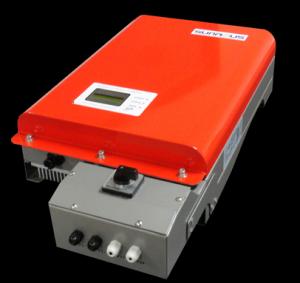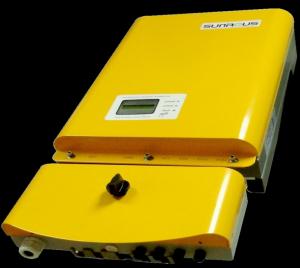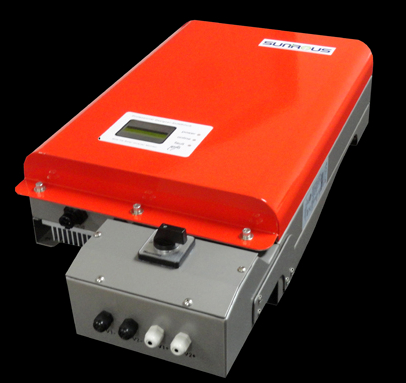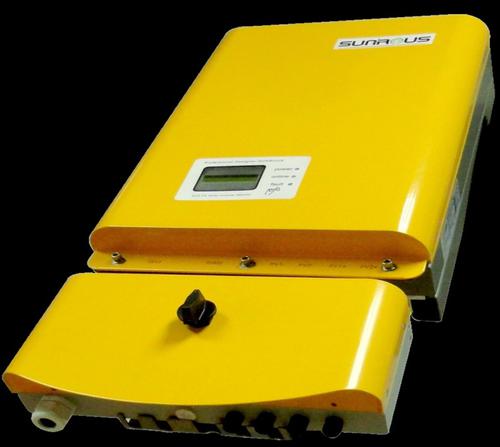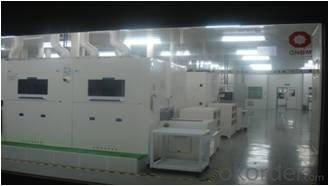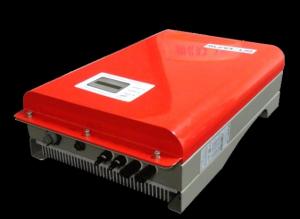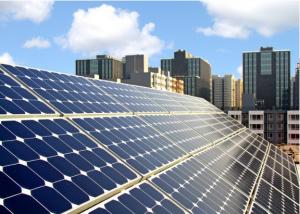Solar Inverter 30kw High Frequency Transformer Isolation PV Grid-Tied Inverter
- Loading Port:
- Shanghai
- Payment Terms:
- TT or LC
- Min Order Qty:
- 50 mm
- Supply Capability:
- 1000 mm/month
OKorder Service Pledge
OKorder Financial Service
You Might Also Like
· The highest effciency achieves 98%
· Wide input Voltage range
· Adopt connectors type cable connection, Easy operation and installation
· Best tracking effciency with OptiTrac MPP control
· operating temperature range -25 ℃ to + 55℃
· High reliability due to complete protection function
· Anti-theft protection
· Plug-in grounding
HF series 1.5kw — 5.0kw
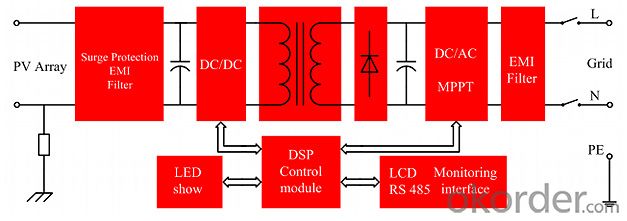
High frequency transformer isolation is the main feature of our production, which make Installation easier due to the reduced weight and higher conversion effciency because of omitting Low frequency transformer. The wide input voltage range from 180 to 600volt gives you extraordinary fexibility for you system design. Not need to set graphic display and RS485 communication system make the devices highly user-friendly.
This product can by multi-level parallel combination for 6kw to 20kw needed any power grade HF series technical parameter.
parameters:
GT1.5-ZX-01/HF | GT2.0-ZX-01/HF | GT2.5-ZX-01/HF | GT3.0-ZX-01/HF | GT4.0-ZX-01/HF | GT5.0-ZX-01/HF | |
Input(DC) | ||||||
Max.DC Power | 1600W | 2100W | 2650W | 3150W | 4200W | 5200W |
Max.DC Voltage | 600V | |||||
PV Voltage range, MPPT | 150V ~ 550V | 150V ~ 550V | ||||
Max.input current | 10.0A | 14.0A | 16.0A | 20.0A | 25.0A | 30.0A |
Number of MPP trackers | 1 | |||||
Max.number of strings (parallel) | 1 | 1 | 2 | 2 | 3 | 3 |
Output(AC) | ||||||
Nominal AC power / | 1500W | 2000W | 2500W | 3000W | 4000W | 5000W |
Max.output current | 13.0A/7.0A | 17.0A/9.0A | 21.0A/12.0A | 25.0A/14.0A | 21.0A | 30.0A |
Nominal AC Voltage / range | 102-138Vac/180-264Vac | 180-270Vac | ||||
AC grid frequency / range | 47.5-51.5Hz / 59.3-60.5Hz | |||||
Power factor at rated power | 1 | |||||
THD | < 3% | |||||
AC connection | Single-phase | |||||
Efficiency | ||||||
Max. efficiency/Californian efficiency | > 98.0% / > 97.0% | |||||
MPP adaptation efficiency | > 99.0% | |||||
Protection devices | ||||||
DC reverse polarity protection | √ | |||||
AC short-circuit protection | √ | |||||
Ground fault monitoring | √ | |||||
Grid monitoring | √ | |||||
Output Transient Voltage Suppression | √ | |||||
Over load | √ | |||||
Anti-islanding | √ | |||||
General data | ||||||
Dimensions (W/ H / D) in mm | 350 / 560 / 160 | 370 / 540 / 185 | ||||
Weight(Kg) | 16 | 19 | 23 | |||
Operating temperature range | -25 ~ +60℃ | |||||
Storage temperature range | -40 ~ +70℃ | |||||
Ambient humidity | 0 ~ 100% | |||||
Consumption (night) | < 0.5W | |||||
Topology | HF-transformer galvanic isolation | |||||
Cooling concept | Convection | |||||
Enclosure type | IP65 / NEMA 3R | |||||
Features | ||||||
DC connection: PV special connector | √ | |||||
AC connection: connector | √ | |||||
LCD display & Backlit | √ | |||||
LED display | √ | |||||
Interfaces: RS485 | √ | |||||
Warranty: 10 years | √ | |||||
Certificates & approvals | G83 / G59 / TUV / SAA / ETL / JET/ CE | |||||
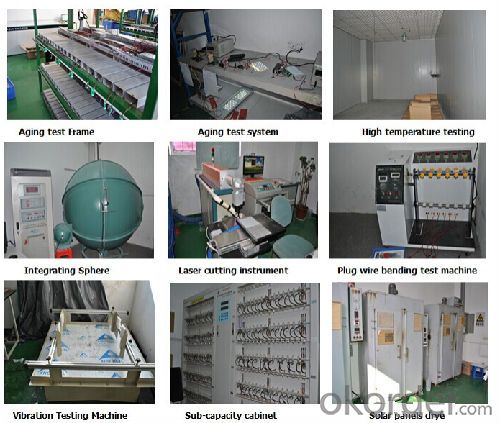
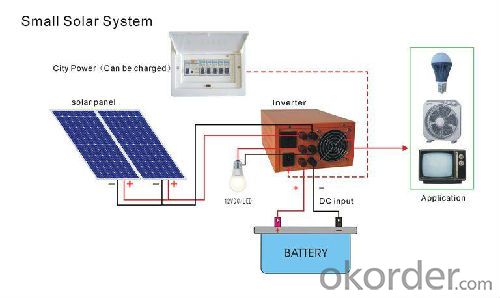
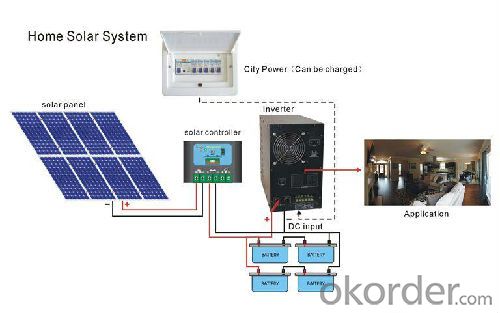
FAQ
Q1 : Do you accept OEM/ODM?
ODM&OEM are warmly welcomed !!!
Q2 : what’s your payment?
a)We can accept payment terms of T/T, Western Union, PayPal
Samples and trial order accept PayPal ,T/T & Western Union. normal order accept T/T &Western Union
b) 30% ADVANCE DEPOSIT after buyer's confirmed payment, the balance should be paid before shipping when goods are ready.
- Q: How does a solar inverter handle power quality disturbances?
- A solar inverter handles power quality disturbances by employing various protective measures. It typically includes features such as voltage regulation, frequency control, and surge protection. In the case of voltage fluctuations, the inverter adjusts the output voltage to maintain a stable power supply. Similarly, it monitors the grid frequency and adjusts its output frequency accordingly. Moreover, it incorporates surge protection mechanisms to safeguard against power surges and voltage spikes. Overall, a solar inverter efficiently manages power quality disturbances to ensure a reliable and stable electricity supply.
- Q: Can a solar inverter be upgraded or expanded?
- Yes, a solar inverter can be upgraded or expanded. Upgrades may involve adding new features or improving the efficiency of the existing inverter. Expansion typically refers to increasing the capacity of the inverter to accommodate additional solar panels. However, the extent to which an inverter can be upgraded or expanded varies depending on the specific model and manufacturer.
- Q: Can a solar inverter be used with a smart home automation system?
- Yes, a solar inverter can be used with a smart home automation system. Many modern solar inverters are equipped with communication interfaces such as Wi-Fi or Zigbee, allowing them to integrate seamlessly with smart home automation systems. This integration enables homeowners to monitor and control their solar energy production, consumption, and storage remotely, and optimize their energy usage for increased efficiency and cost savings.
- Q: Can a solar inverter be used with a solar-powered healthcare system?
- Yes, a solar inverter can be used with a solar-powered healthcare system. A solar inverter is responsible for converting the direct current (DC) generated by solar panels into alternating current (AC) that can be used to power various appliances and systems, including healthcare equipment. By integrating a solar inverter into a solar-powered healthcare system, the generated solar energy can be efficiently utilized to run medical devices and provide reliable electricity for critical healthcare services.
- Q: How do you calculate the power output of a solar inverter?
- To calculate the power output of a solar inverter, you need to multiply the input voltage by the input current. This will give you the input power. Then, multiply the efficiency of the inverter by the input power to get the output power.
- Q: Are there any safety concerns associated with solar inverters?
- Yes, there are some safety concerns associated with solar inverters. One of the primary concerns is the risk of electrical shocks or fires due to faulty installation or maintenance of the inverter. Additionally, some inverters may generate heat during operation, and if not properly ventilated, it can pose a fire hazard. It is crucial to follow proper installation guidelines, regularly maintain the inverter, and hire qualified professionals to minimize these safety risks.
- Q: How does a solar inverter handle shading on the solar panels?
- A solar inverter typically handles shading on solar panels by using a technology called Maximum Power Point Tracking (MPPT). MPPT enables the inverter to constantly monitor the performance of each individual solar panel and adjust its voltage and current to ensure maximum power output. When shading occurs on a panel, the MPPT algorithm detects the drop in power and adjusts the system to bypass the shaded panel or operate it at a different voltage, allowing the other unshaded panels to continue producing power efficiently. This helps to mitigate the impact of shading on the overall system performance.
- Q: What are the potential risks of overvoltage in a solar inverter?
- The potential risks of overvoltage in a solar inverter include damaging the inverter itself, reducing its lifespan, and potentially causing a fire or electrical hazard. Overvoltage can also lead to the failure of other connected components, such as solar panels or batteries, and may even result in a complete system shutdown. It is crucial to implement protective measures, such as surge protectors or voltage regulators, to mitigate the risks associated with overvoltage.
- Q: How does a solar inverter handle shading or partial obstruction of solar panels?
- A solar inverter is equipped with a technology called Maximum Power Point Tracking (MPPT) which allows it to handle shading or partial obstruction of solar panels. MPPT enables the inverter to constantly monitor the output of each individual solar panel and adjust the system's voltage and current accordingly. By doing so, the inverter ensures that the shaded or partially obstructed panels do not significantly affect the overall performance of the solar array. This way, it optimizes the energy production of the unshaded panels while minimizing the impact of shading on the system's efficiency.
- Q: What is the role of a solar inverter in voltage control?
- The role of a solar inverter in voltage control is to convert the direct current (DC) electricity generated by solar panels into alternating current (AC) electricity that is suitable for use in homes and businesses. Additionally, the solar inverter helps regulate the voltage levels of the AC electricity to ensure it is stable and compatible with the electrical grid.
Send your message to us
Solar Inverter 30kw High Frequency Transformer Isolation PV Grid-Tied Inverter
- Loading Port:
- Shanghai
- Payment Terms:
- TT or LC
- Min Order Qty:
- 50 mm
- Supply Capability:
- 1000 mm/month
OKorder Service Pledge
OKorder Financial Service
Similar products
Hot products
Hot Searches
Related keywords
